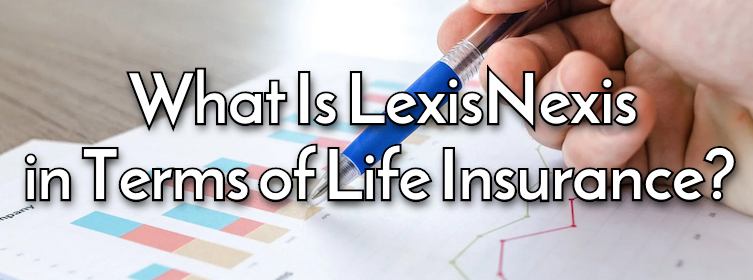When shopping for life insurance, you may hear the name LexisNexis thrown around, particularly in reference to LexisNexis reports. If you’ve never purchased life insurance before, you may be confused about what exactly this is and how it affects your insurance. Here’s what you need to know about LexisNexis in relation to life insurance.

What is LexisNexis?
LexisNexis is a company that collects and aggregates a number of different types of data. They collect data in a huge range of industries and work with companies around the world to provide them with information. When LexisNexis works with life insurance companies, they compile consumer reports that the insurer can then use to determine premium costs and underwrite the policy. There are many other industries that use similar LexisNexis consumer reports, including law enforcement, finance, healthcare, and more. The reports aggregate data that is currently available online about the person in question and determines the overall risk for the insurer to serve you.
What’s on my LexisNexis report?
At this point, you’re probably wondering exactly what information is on your LexisNexis report. When insurance companies request this report, they’ll get information on your credit score, including things like outstanding liens, mortgages, and bankruptcies. They’ll also get information on any properties you own and professional licenses you may have, as well as any criminal offenses and weapons licenses. This information is pulled from a number of different online databases, and LexisNexis assembles it into a report that’s easy for your insurance provider to read and understand.
Why does insurance rely on LexisNexis?
When you apply for an insurance policy, your insurer wants to know how much of a risk you are to cover. The more likely you are to die, the higher your monthly premiums will be – this compensates for the higher financial risk the company takes on by insuring you. Statistically, people with lower credit scores and financial standings are likely to die earlier. This is why insurance companies will check your credit score when you apply for life insurance. There are some states that have laws prohibiting insurers from checking your credit during the underwriting process. However, they may still look at LexisNexis reports for other information about your background.
Can I check my LexisNexis report?
Under the Fair Credit Report Act, you can always check your LexisNexis report. You can go online to the LexisNexis website to request your report, or you can call their customer service center. You will need to fill out a form with identifying information in order to access your report, including your social security number, birth date, and address. This is to protect your privacy and prevent identity theft, ensuring that only you can access your report. It’s important to check your LexisNexis report occasionally to catch and correct mistakes. While the company’s data aggregation techniques are normally fairly accurate, they do make the occasional mistake. If you notice a mistake on your LexisNexis report, you can work with them to correct the problem.
You can also use other credit monitoring services to ensure your credit score is up to par. Services like Credit Karma, Privacy Guard, and Credit Sesame will all allow you to keep an eye on your credit report and score.
How can I improve my LexisNexis report?
It can be difficult to improve your LexisNexis report right away because they are complex and examine a wide range of different data points. The best way to improve your LexisNexis report is to keep an eye on your credit score. Your credit score is one of the biggest factors in your overall LexisNexis report. To keep your credit score up, make sure you’re paying your bills on time, keep your credit usage at under 50 percent, and be careful with your credit inquiries. You should also be careful of things like driving tickets and any other legal citations, which will also show up on your LexisNexis report and can negatively affect your insurance prices.
LexisNexis has completely changed the way insurance companies conduct their underwriting process and determine premium costs. Not only does it allow insurers to compile information much faster, but it also allows them to access much more detailed information than they could before the advent of data aggregation. When applying for life insurance, it’s important to understand what LexisNexis is and how it affects your overall premiums.

